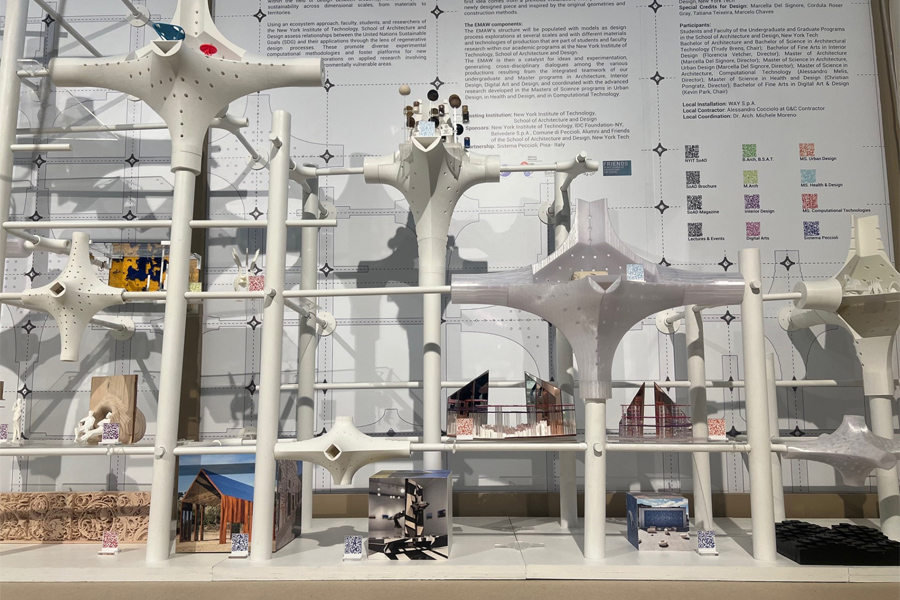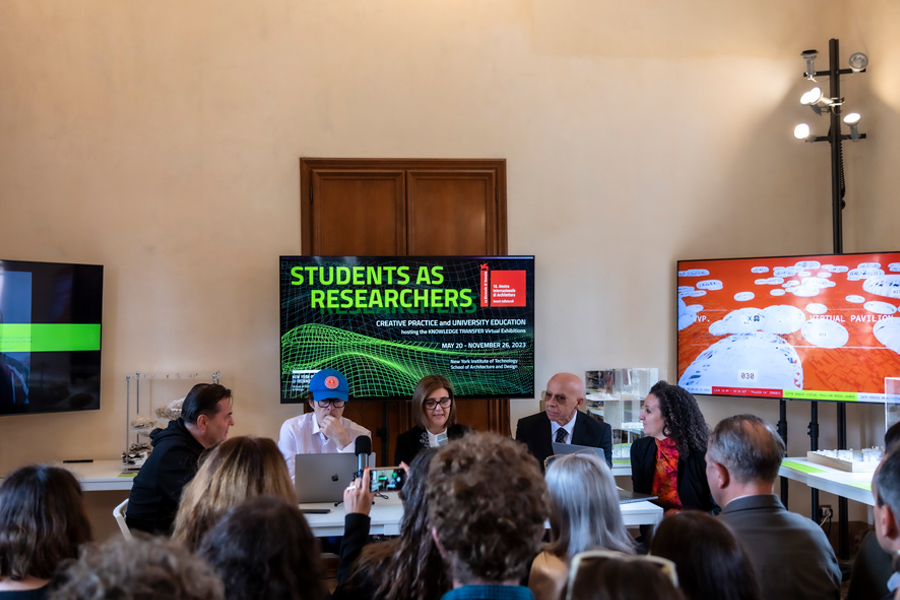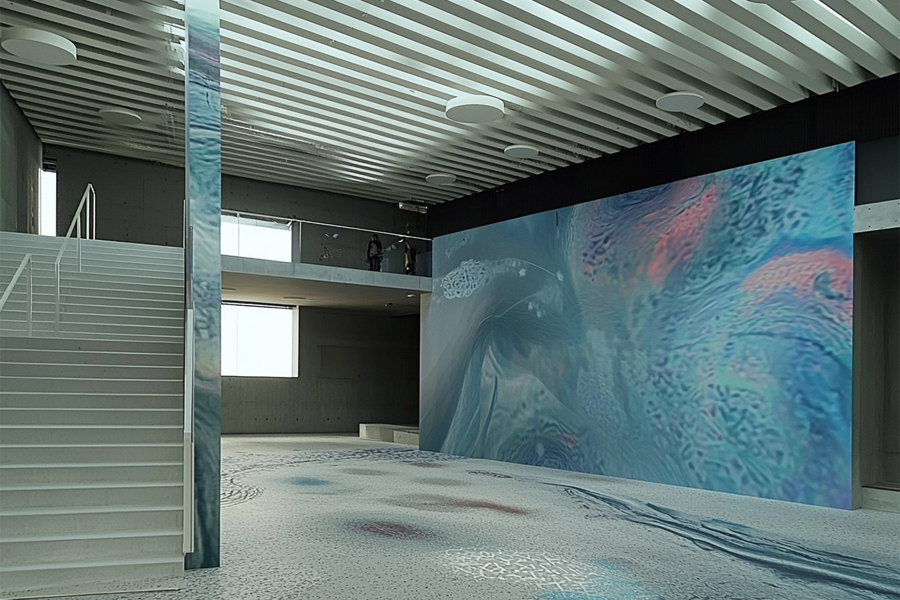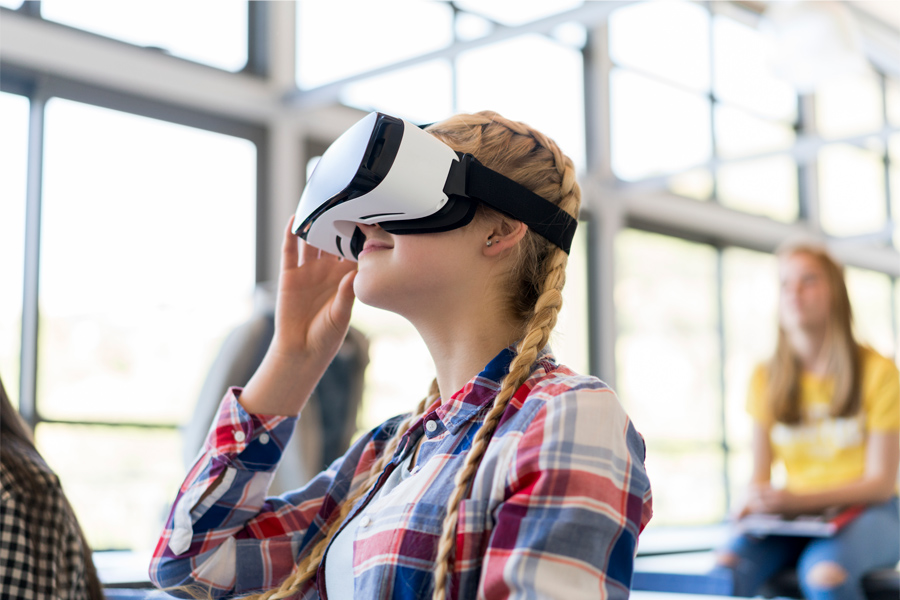
AI in Action
At New York Tech, we’re integrating AI into departments, programs, courses, and projects, to ensure our students—the doers, makers, innovators, and healers of tomorrow—are equipped for the world’s new challenges.
Integrating AI and Architecture
“The Future of Design” – Salone del Mobile Milano
An exhibition and art installation at the Salone del Mobile Milano (Italy) showcased forward-thinking integration of digital technologies and AI into video art and sustainable urban design, highlighting innovative approaches to contemporary design challenges and facilitating critical industry-academic partnerships focused on sustainable futures.

Students as Researchers
This video project, displayed at a collateral at the 18th Venice Biennale, showcased the pioneering integration of AI within architectural research and design pedagogy, illustrating how AI methodologies can enhance student-driven inquiry and creativity in design and the transformative educational potential of AI.

SR-1938
A multi-year, multidisciplinary collaboration at the University of Pisa (Italy) integrating AI with public art, academic discourse, media communication, and scholarly research, aiming to deepen exploration into sustainable urbanism and technology-driven design innovation.

“GeoCities” Public Art Installation
This site-specific installation at the Italian consulate in Tenerife, Spain, emphasized sustainability, culture, and advanced technology, including patented Active Surfaces and AI-informed design processes, to foster meaningful public interaction and dialogue, and promote international recognition of sustainable and AI-enhanced design practices through innovative, technology-driven public art.

From the Cave to AI 3-D Fabrication Installation
A visually immersive digital media and AI-integrated architectural installation at the Italian Embassy in London explored contemporary themes of urban sustainability and innovative design practices. The installation prominently utilized additive and subtractive digital fabrication workflows enabled by AI technologies.

Reinventing the Future With AI

Learning Computational Mathematics with Wolfram
To help students with algorithm development in the Math 330 course, we’ve integrated Wolfram’s new Notebook Assistant, which combines the power of computational software Mathematica with an LLM toolkit to complement their learning and explore new and exciting ways to interact with mathematics.

Evaluating the Use of Artificial Intelligence in Biomedicine
In BIOL 315, an introductory neuroscience course, we discuss artificial neural networks (ANN) in the context of biological learning and memory, as well as their application to biomedicine. Despite some impressive feats, we find ANNs are extremely unreliable, making them poor substitutes for human/physician judgment.

Watson: Our Virtual Reality AI Learning Assistant
The New York Tech Learning Center has been piloting a virtual reality tutoring/learning initiative using the CurioXR app on the Meta Quest. This platform features Watson, an embedded AI learning assistant offering guidance to students and creating a supportive and user-friendly VR learning environment.

Teaching Statistics in RStudio with the Help of GitHub Copilot
Modern statistics are done on computers, but many introductory statistics students struggle to see the science for the syntax. Using GitHub Copilot, a code-completion assistant from Microsoft’s OpenAI, integrated into biomedicine’s RStudio statistics software package, faculty from the Department of Biological and Chemical Sciences are helping students learn how these free tools can perform sophisticated analyses on fun datasets.

Exploring AI as a Tool in Remote Learning Assessment
To address the unique challenges of remote learning assessment, School of Management faculty are evaluating applications of AI in preparing and conducting oral examinations for online courses. Empowering students to leverage generative AI for self-quizzing enhances their readiness for in-person multiple-choice exams, techniques that also prove valuable for impromptu in-class quizzes and exam reviews, fostering active learning and retention.

Using ChatGPT to Enhance Motivational Interviewing Skills
Motivational Interviewing (MI) skills are critical for helping patients develop motivation for behavior change. Acting as clients, students from the School of Health Professions ask ChatGPT to perform MI on them. After annotating the conversation transcripts to highlight key MI strategies, they switch roles and enlist ChatGPT to act as a non-compliant client as they practice their MI skills. Classes that completed the training scored 77 percent higher on MI knowledge.
Piloting AI for Data Insights
New York Tech is piloting a project with HelioCampus that integrates an AI-powered chatbot with the university’s data reporting and analytics systems to make data more accessible to a wider audience. The chatbot’s “semantic layer” will enable users to extract actionable insights using natural language, making its output reliable even for users who aren’t versed in prompt engineering.
